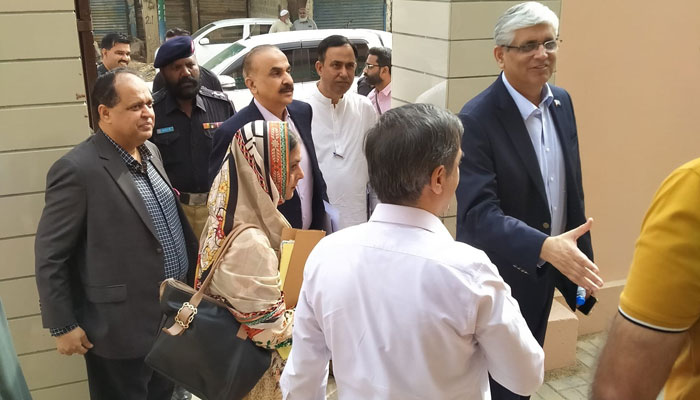Sindh plans to roll out universal health insurance scheme in January
KARACHI: Sindh’s caretaker government has said that it is planning to introduce a universal health insurance scheme for the people of the province for the first time.
Talking to media persons on Tuesday, interim health minister Dr Saad Khalid Niaz said the caretaker provincial government has been planning to roll out the health insurance scheme in January.
According to the provincial government’s decision, Sindh is going to join the federal government’s universal health insurance programme introduced during the previous government led by the Pakistan Tehreek-e-Insaf (PTI). The Punjab and Khyber Pakhtunkhwa provinces, and the Islamabad Capital Territory initially joined the universal health insurance programme during the PTI’s rule.
The then Sindh government of the Pakistan Peoples Party had refused to become a part of the programme on the premise that it was unfeasible to roll out a universal health insurance package for all the people when the province spent billions of rupees every year for the provision of completely free health services at several public health facilities in the province.
The then health minister Azra Fazal Pechuho had said that launching the health insurance programme would provide a chance for private hospitals to exploit the scheme to mint money through exorbitant billing, as there would be no check on the charges to be received by private health facilitates on the treatment of underprivileged patients.
Balochistan joined the Centre’s health insurance scheme during the current tenure of the interim government. Dr Niaz said Sindh’s caretaker government would do its best for up to 50 per cent of the deserving population of the province to get completely free treatment services at public and private hospitals under the universal health insurance scheme.
He said the beneficiaries of the proposed health insurance scheme should possess computerised national identity cards to prove that they are bona fide residents of Sindh. Every beneficiary family is likely to get annual health treatment services costing between Rs400,000 and Rs1 million, he added.
A federal health official told The News that the Centre had agreed to the proposal that a minimum of 30 per cent of the population in the province, comprising underprivileged families, should get free treatment services at public and private hospitals in Sindh.
He said that the remaining part of the population possessing varying degrees of spending power to get health treatment services would be required to pay up to 30 per cent of the expenditure to be borne after getting services from a private hospital.
The universal health insurance scheme to be launched in the province for the first time will also cover primary healthcare services, as the insurance scheme in the rest of the country only covers tertiary and secondary health sectors, he added.
-
 Andrew Mountbatten Windsor Faces Future With UK MPs, Says Expert
Andrew Mountbatten Windsor Faces Future With UK MPs, Says Expert -
 Shamed Andrew Told 'nobody Is Above The Law' Amid Harrowing Silence
Shamed Andrew Told 'nobody Is Above The Law' Amid Harrowing Silence -
 Gisele Bundchen Melts Hearts With Sweet Bike Ride Glimpse Featuring Son
Gisele Bundchen Melts Hearts With Sweet Bike Ride Glimpse Featuring Son -
 Prince William Found Meghan Markle ‘quite Refreshing’ At Start
Prince William Found Meghan Markle ‘quite Refreshing’ At Start -
 Kate Middleton Knew Should Could Not Be ‘voice Of Reason’ With Prince Harry
Kate Middleton Knew Should Could Not Be ‘voice Of Reason’ With Prince Harry -
 Rihanna Has Wardrobe Malfunction At A$AP Rocky Fashion Show
Rihanna Has Wardrobe Malfunction At A$AP Rocky Fashion Show -
 Prince Harry Felt System Had ‘one Rule For Him, One For Prince William’
Prince Harry Felt System Had ‘one Rule For Him, One For Prince William’ -
 Jake Paul's Fiancée Sends Him Over The Moon Over Stunning Victory
Jake Paul's Fiancée Sends Him Over The Moon Over Stunning Victory -
 Harper Beckham Sends Valentine’s Love Amid Brooklyn Family Drama
Harper Beckham Sends Valentine’s Love Amid Brooklyn Family Drama -
 Why Prince William, Kate Middleton 'partnership' Is Important For Monarchy
Why Prince William, Kate Middleton 'partnership' Is Important For Monarchy -
 Katie Price Drama Escalates As Family Stays In Touch With Ex JJ Slater
Katie Price Drama Escalates As Family Stays In Touch With Ex JJ Slater -
 Critics Target Palace Narrative After Andrew's Controversy Refuses To Die
Critics Target Palace Narrative After Andrew's Controversy Refuses To Die -
 Sarah Ferguson’s Delusions Take A Turn For The Worse: ‘She’s Been Deserted’
Sarah Ferguson’s Delusions Take A Turn For The Worse: ‘She’s Been Deserted’ -
 ICE Agents 'fake Car Trouble' To Arrest Minnesota Man, Family Says
ICE Agents 'fake Car Trouble' To Arrest Minnesota Man, Family Says -
 Camila Mendes Reveals How She Prepared For Her Role In 'Idiotka'
Camila Mendes Reveals How She Prepared For Her Role In 'Idiotka' -
 China Confirms Visa-free Travel For UK, Canada Nationals
China Confirms Visa-free Travel For UK, Canada Nationals




